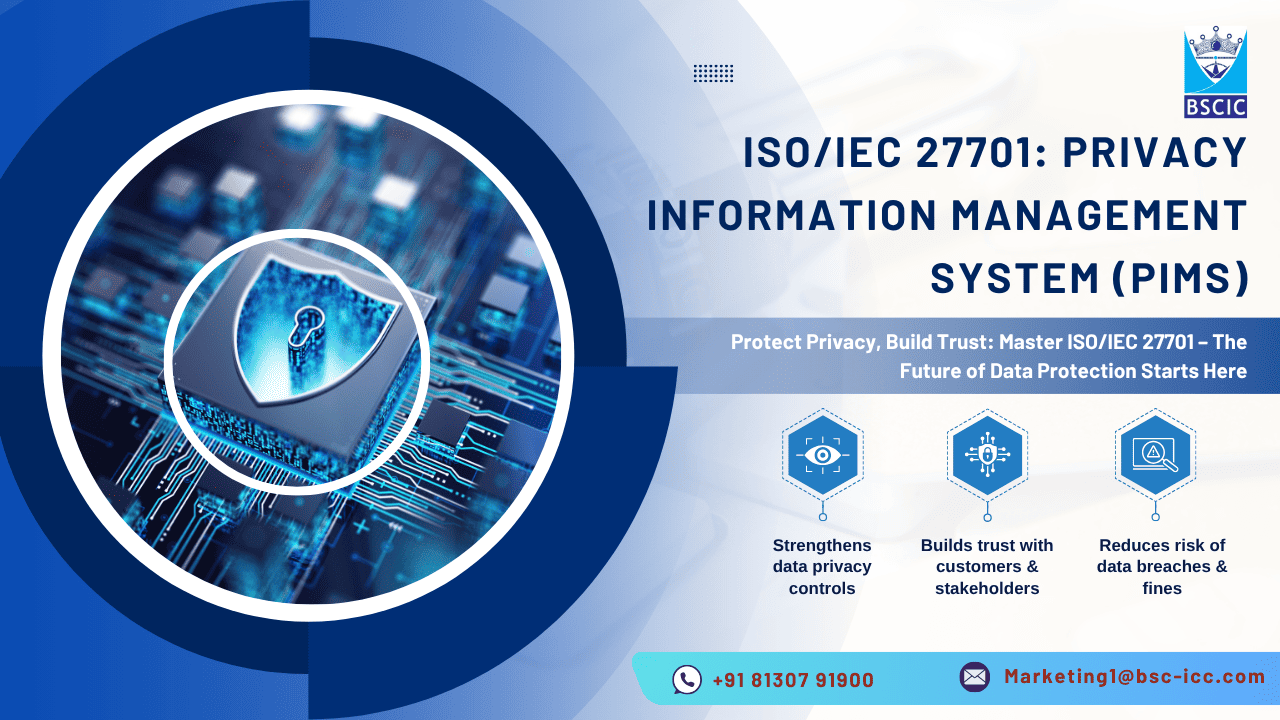
ISO/IEC 27701: Privacy Information Management System (PIMS)
Overview
ISO/IEC 27701, published in 2019, is an extension of ISO/IEC 27001 (Information Security Management) and ISO/IEC 27002 (security controls). It focuses on Privacy Information Management, particularly around the processing and protection of Personally Identifiable Information (PII).
It serves as a practical implementation tool for organizations seeking to manage privacy risks and demonstrate compliance with global privacy frameworks, such as:
- General Data Protection Regulation (GDPR) – EU
- California Consumer Privacy Act (CCPA) – USA
- Personal Information Protection and Electronic Documents Act (PIPEDA) – Canada
- Personal Data Protection Act (PDPA) – Singapore
Key Components of ISO 27701
1. PIMS-Specific Requirements
Extends the ISMS with privacy-specific controls and requirements tailored to PII controllers and PII processors.
2. Clarified Roles
Clearly distinguishes between responsibilities of PII controllers (those who determine the purpose of processing) and PII processors (those who process on behalf of controllers).
3. Control Enhancements
Builds on the ISO 27002 control set by adding or modifying controls specifically for privacy management.
4. Policy Development
Guides the creation and maintenance of privacy policies, notices, and procedures aligned with legal expectations.
Expanded Benefits of ISO 27701 PIMS
1. Regulatory Alignment Across Jurisdictions
- Offers a structured framework to meet multiple regulatory requirements.
- Reduces the complexity of managing cross-border data flows.
- Acts as a privacy compliance roadmap for multinational companies.
2. Proactive Data Protection Posture
- Moves the organization from reactive to proactive privacy management.
- Embeds privacy-by-design and privacy-by-default principles into processes and systems.
- Reduces incident response costs by having defined protocols.
3. Third-Party Assurance
- Demonstrates due diligence and compliance to external stakeholders.
- Strengthens vendor management by enabling assessment of third-party privacy controls.
4. Operational Efficiency
- Combines security and privacy programs, minimizing duplication.
- Aligns privacy efforts with existing ISO 27001 governance, simplifying audits and resource allocation.
5. Enhanced Risk Management
- Integrates privacy impact assessments (PIAs) and data protection impact assessments (DPIAs).
- Offers a systematic approach to identifying and mitigating privacy risks, including data minimization and retention controls.
6. Supports Certification and Accountability
- Can be audited and certified, providing a formal declaration of conformance.
- Reinforces organizational accountability and transparency under laws like GDPR (Article 5 and 24).
7. Facilitates Business Growth
- Meets procurement requirements where privacy standards are mandatory.
- Enables smoother entry into privacy-sensitive markets (e.g., healthcare, finance, EU markets).
- Increases customer trust and can improve customer acquisition and retention rates.
Use Cases and Applicability
- Technology Companies: Managing user data and complying with global regulations.
- Healthcare Organizations: Protecting patient records under HIPAA/GDPR.
- Financial Institutions: Managing client PII and transaction data.
- Cloud Providers: Demonstrating privacy assurance to customers.
- Government Entities: Enhancing trust and protecting citizen data.
Conclusion
ISO/IEC 27701 provides a robust and internationally recognized framework to manage privacy risks and demonstrate compliance with diverse legal regimes. By embedding privacy within an organization’s information security structure, it enhances resilience, reduces liability, and builds lasting trust with stakeholders.
Whether you're a data controller or processor, adopting ISO 27701 empowers your organization to shift from compliance uncertainty to operational confidence. It’s not just a compliance checkbox—it’s a strategic investment in long-term data governance and privacy excellence.

